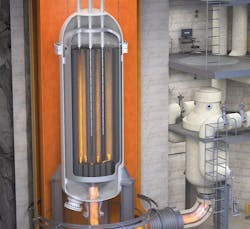NRC Approves Fuel Design for NANO, University of Illinois Work on SMR Nuclear
The U.S. Nuclear Regulatory Commission has approved the nuclear fuel design for a small modular reactor (SMR) project collaboration between NANO Nuclear Energy and the University of Illinois Urbana-Champaign.
The NRC’s positive safety evaluation on fuel qualification methodology (FQM) paves the way for work to continue around Nano’s stationary KRONOS micro modular test reactor (MMR) planned to built on the UIUC campus. NANO Nuclear will now proceed to submitting a construction permit application for the first KRONOS reactor.
The university and KRONOS announced their on-campus collaboration earlier this month. The deal established UIUC as a partner in the licensing, siting, public engagement and research operations of the first KRONOS MMR reactor on campus.
The approved FQM explains the regulatory framework and testing approach for the qualification of Fully Ceramic Microencapsulated (FCM) fuel, which incorporates tri-structural isotropic (TRISO) fuel particles embedded in a silicon carbide matrix.
“Our next steps include finalizing fuel fabrication timelines, preparing and submitting the construction permit this year, and completing early-stage site work at U. of I., including geotechnical drilling and environmental assessments,” Florent Heidet, Chief Technology Officer and Head of Reactor Development of NANO Nuclear, said in a statement.
The FQM TR had gone through a joint review by the NRC and the Canadian Nuclear Safety Commission (CNSC), with initial participation from the UK’s Office for Nuclear Regulation (ONR) as an observer. The final approval of the FQM TR by the NRC will help provide a repeatable pathway for advanced fuel qualification applicable to NANO Nuclear reactors.
The KRONOS technology developed by Nano is a high-temperature, gas-cooled reactor design. NANO Nuclear is beginning work on geological characterization and subsurface investigation to prepare for its pending construction permit application. Once built, the project will serve as a national platform for research, training and demonstration of TRISO fuel operation and small modular reactors.
Nuclear reactor energy is carbon-free and is increasingly seen as a solution to meeting the nation’s future load demand from data centers, AI training, EV charging infrastructure and industrial electrification. In addition to UIUC, numerous universities are working on SMR research including Texas A&M and Abilene Christian.
Recently the U.S. government’s Department of Energy Office of Nuclear Energy announced millions of dollars in grants to help upgrade nuclear research and development infrastructure at universities and colleges nationwide. Recent DOE university nuclear research grant winners include Purdue, Florida, New Mexico and the University of Texas at Austin.
No SMR projects have been built or operated in the U.S. yet, but numerous startups are working on reactor design they hope to have implemented by the mid-2030s.
The University of Illinois system’s experience in nuclear energy research dates to the middle of the 20th century. The UI’s Advanced Teaching Research Isotope General Atomic Mark II reactor went critical in 1960, training nuclear engineering students for nearly 40 years before shutting down in 1998.
Research into nuclear fusion possibilities began at the UIUC campus in 2014.
